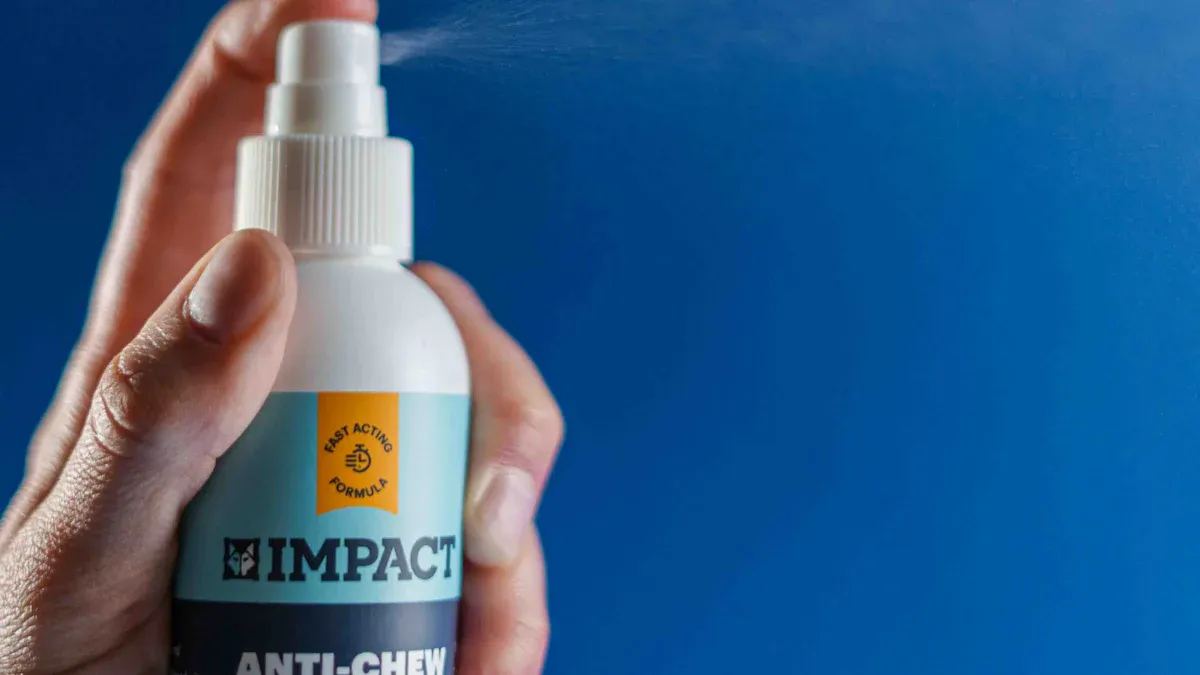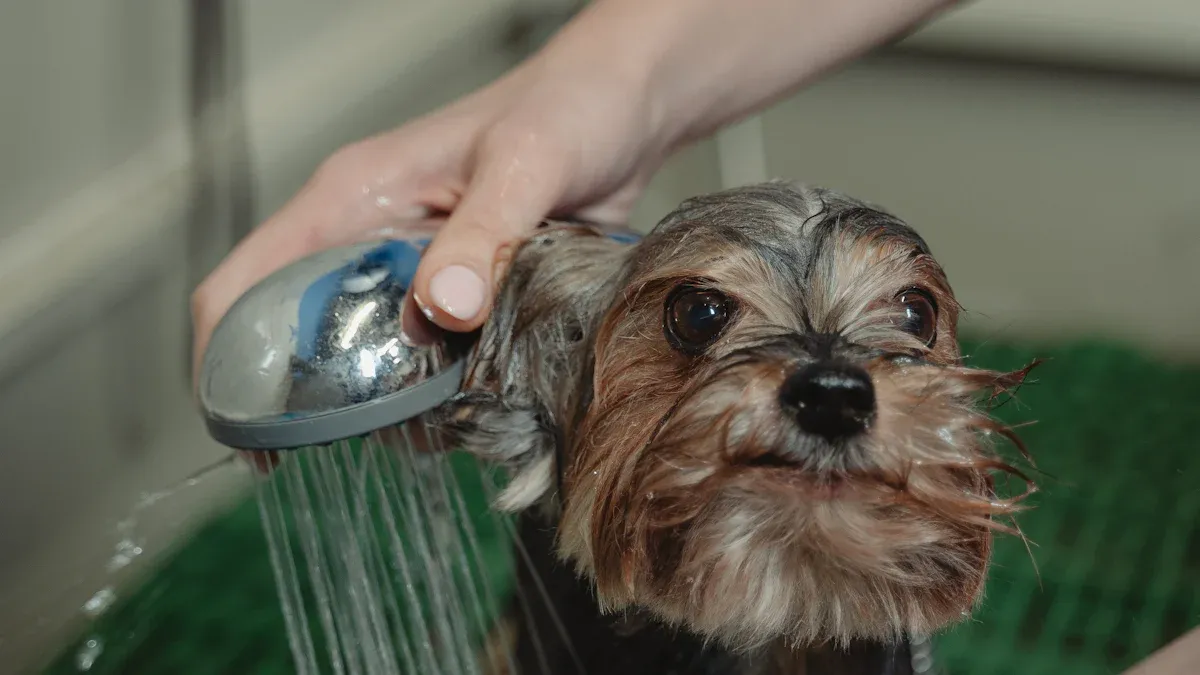
You want your house to smell nice, not like pets. Chemical cleaners can be bad for your pets’ health, which is why exploring pet odor removal solutions is essential.
|
Chemical |
|
|---|---|
|
Bleach |
Cancer, breathing problems |
|
Ammonia |
Hurts nose, eyes, and mouth |
|
Chlorine |
Hurts skin, eyes, and lungs |
|
Glycol Ethers |
Can hurt liver and kidneys |
|
Formaldehyde |
Can cause cancer and other problems |
Natural pet odor removers are among the best pet odor removal solutions, helping keep everyone safe. You can use them easily and safely with any pet.
Key Takeaways
-
Pick natural pet odor removers to keep your home safe. These are good for the environment and work well.
-
Clean your pet's bedding and toys often to stop smells. Use natural detergents to get the best results.
-
Open windows and use fans every day to air out your home. Fresh air helps lower pet smells and makes the air better.
Why Pet Odors Happen
Common Causes
You might notice pet smells even when you clean often. Pets can leave behind waste, which gives off ammonia. This can make the air in your home feel stuffy and even cause breathing problems. Pet dander, or tiny flakes of skin, floats through the air and settles on furniture. If you or someone in your family has allergies, dander can make things worse.
Bacteria and viruses also play a big part in pet odors. When your pet comes inside after playing, they can bring in germs from outside. These germs can grow in damp places, like carpets or pet beds. If your home feels humid, it can make things worse. Mold and dust mites love moisture, and they add to the smell. Try to keep your home’s humidity between 30% and 50%. This helps stop mold and keeps the air fresh.
Tip: Regular cleaning of your pet’s favorite spots can help keep odors under control and make your home healthier.
Importance of Natural Solutions
You want your home to smell good, but you also want to keep your pets safe. Natural pet odor removal solutions are a smart choice. They are safer for your pets and better for the planet. Chemical cleaners might work fast, but they can be risky for both pets and kids. Natural products, like reusable deodorant pouches, last longer and do not fill your home with harsh smells.
-
Natural solutions are generally safer and more eco-friendly.
-
Chemical solutions act faster but pose safety risks.
-
Natural products provide long-lasting odor control without harmful chemicals.
When you use natural methods, you protect your family and your furry friends. You also help the environment by avoiding harsh chemicals. Choosing natural pet odor removal solutions means you get a clean home and peace of mind.
Ventilate Your Home

Open Windows
Fresh air is your best friend when you want to get rid of pet smells. You can open windows in different rooms to let clean air flow through your house. This simple step helps push out stale air and brings in a breeze that feels refreshing. If you keep vents and registers clean, you improve airflow even more. Sometimes, you might forget about exhaust fans in places like the bathroom or kitchen. Turn them on for a few minutes after you use these rooms. They help vent out moisture and old air, which can make pet odors worse.
Tip: Try to open your windows for at least 10–15 minutes every day. You’ll notice a big difference in how your home smells.
If you want to take things up a notch, you can look into whole-home ventilation systems. These systems keep air moving all the time, so your house stays fresh and odor-free.
-
Keep vents and registers clean.
-
Use exhaust fans in damp areas.
-
Consider installing a whole-home ventilation system.
Use Fans
Fans do more than just cool you down. They help move air around, which makes pet odors less noticeable. When you use fans, you dilute smelly compounds and send them outside. This means your home smells cleaner and feels more comfortable. Fans also remove moisture from the air, so you don’t get that musty smell that sometimes comes with pets.
-
Fans help disperse and dilute odors.
-
They push out moist air, reducing moldy smells.
-
Fans remove airborne particles that carry pet odors.
If you want a quick fix, turn on a ceiling fan or a portable fan. You’ll see how much fresher your space feels. 😊
Pet Odor Removal Solutions
Baking Soda
Most people have baking soda in their kitchen. It is a simple way to help with pet smells. Just sprinkle some on carpets, pet beds, or your couch. Wait at least 15 minutes before cleaning it up. If the smell is strong, leave it overnight. Then vacuum the area. Baking soda soaks up and removes bad smells.
Baking soda is a base. Pet urine is acidic. When you mix them, baking soda can change the acid. This helps get rid of the smell.
You can also put baking soda in your laundry. Use it when you wash pet blankets or towels. This makes them smell better and keeps your home fresh.
Vinegar Spray
Vinegar is another natural cleaner for pet smells. Mix the same amount of white vinegar and water in a spray bottle. Spray it on carpets, furniture, or places where your pet had an accident. Wipe the spot with a clean cloth. Vinegar helps with light smells.
-
Vinegar and baking soda can help with pet urine smells for a short time, but they do not work forever.
-
Pet urine needs stronger cleaners than just vinegar.
-
Enzyme cleaners are made to break down pet urine, so they work better than vinegar.
If you want more vinegar spray ideas, search “DIY vinegar pet odor spray” on Google.
Enzymatic Cleaners
Enzymatic cleaners are strong pet odor removal solutions. These cleaners use enzymes to break down pet stains and smells. Spray the cleaner on the spot. Let it sit as long as the bottle says. Then blot or rinse the area.
-
Lipases break down fat.
-
Amylases break down starch.
-
Cellulases work on fibers.
-
Proteases break down protein stains and smells, like poop and pee.
Enzymatic cleaners work well on carpets, furniture, and laundry. You can search “best enzymatic cleaner for pet odors” on Google to find good products.
Tip: If you want to use essential oils, pick safe ones like lavender or lemongrass. Always mix them with something else. Never put them right on your pet. Make sure the room has fresh air and keep oils away from pets.
Clean Pet Items
Bedding
Your pet’s bedding can hold onto smells, even if you clean your home often. Washing these items with a natural detergent helps keep odors away and makes your pet’s space fresh. You might wonder how often you should wash everything. Here’s a quick guide:
|
Item |
Recommended Frequency |
|---|---|
|
Dog blankets & towels |
|
|
Pet bed covers |
Every 2-3 weeks |
|
Crate pads |
Weekly or bi-weekly |
If your pet sheds a lot or spends lots of time outside, you may want to wash bedding more often. Always use a gentle, natural detergent. This keeps your pet’s skin safe and avoids harsh chemicals. You can boost odor control by adding a half cup of baking soda to your laundry. Baking soda helps neutralize smells and leaves bedding smelling clean.
Tip: Dry bedding in the sun when you can. Sunlight helps kill germs and freshens fabrics naturally.
Toys
Pet toys get dirty fast. They pick up drool, dirt, and even food bits. You should clean toys regularly to stop smells from building up. Soft toys can go in the washing machine with natural detergent. Toss in some baking soda for extra odor-fighting power. Hard toys, like rubber or plastic, need a good scrub with warm water and mild soap.
-
Wash soft toys every week if your pet uses them daily.
-
Scrub hard toys at least once a week.
-
Check toys for damage before cleaning.
Keeping bedding and toys clean helps your home smell better and keeps your pet healthy. Regular cleaning is simple, and your pet will love their fresh, cozy space!
Groom Regularly

Bathing
You might not realize how much regular baths can help with pet odors. Giving your pet a bath washes away dirt, oils, and anything smelly that sticks to their fur. Clean fur means less odor in your home. Use a gentle, pet-safe shampoo. Harsh soaps can dry out your pet’s skin. If you want to boost odor control, try adding a little baking soda to the bathwater. Baking soda helps neutralize smells and leaves your pet feeling fresh.
How often should you bathe your pet? It depends on their coat type and lifestyle. Check out this handy table for some quick guidelines:
|
Dog Type |
Grooming Frequency |
|---|---|
|
Long-Haired Dogs |
Daily brushing, bathing every 4-6 weeks, haircuts every 10-12 weeks |
|
Short-Haired Dogs |
Brushing at least once a week |
|
Curly-Haired Dogs |
Bathing every 4-8 weeks |
|
Wire-Haired Dogs |
Bathing every 6-8 weeks |
|
Dogs With Double Coats |
Full undercoat removal every 10-12 weeks |
|
Dogs With Silky Hair |
Daily coat combing, haircuts every 4-8 weeks, bathing once a month with baking soda |
|
Other Factors |
Allergies, environment, and seasons can change grooming needs |
Tip: Always dry your pet well after a bath. Damp fur can lead to musty smells.
Brushing
Brushing your pet does more than keep them looking good. It helps stop odors before they start. When you brush, you remove loose fur and dander. These are big reasons why homes start to smell like pets.
-
Brushing often gets rid of loose fur and dander.
-
Clean pets mean less smell in your house.
Try to make brushing a fun time for your pet. Use treats or gentle words. You’ll both enjoy the routine, and your home will smell fresher every day!
Air Purification
Charcoal Bags
You might not realize how much a simple charcoal bag can help with pet smells. Bamboo charcoal bags work like tiny sponges. They soak up odors, moisture, and even some pollutants from the air. These bags use activated bamboo charcoal, which has a special carbon structure. This structure gives the charcoal lots of tiny holes. The holes trap bad smells, including pet odors, and keep your home feeling fresh.
You can place these bags near litter boxes, pet beds, or anywhere your pet likes to hang out. The best part? You do not need to plug them in or spray anything. Just set them out and let them do their job. Every month, put the bags in the sun for a few hours. The sunlight helps recharge the charcoal so you can use the bags again and again.
Tip: Bamboo charcoal bags are safe for pets and kids. They do not add any chemicals to your home.
Air Purifiers
Air purifiers can make a big difference if you want cleaner air. Look for a purifier with a HEPA filter. HEPA filters catch pet dander and hair floating in the air. If you want to tackle pet smells, choose a purifier that also has an activated carbon filter. The carbon filter traps odors and keeps your home smelling fresh.
-
HEPA filters remove pet dander and hair.
-
Activated carbon filters trap pet odors and other smells.
Some air purifiers combine both filters. These models work best for homes with pets. You will notice less dust, fewer smells, and cleaner air. Your family and your pets will breathe easier every day.
Carpets & Furniture
Natural Cleaners
You know how pet smells can stick to carpets and furniture. Sometimes, regular vacuuming just isn’t enough. Natural cleaners help you tackle those stubborn odors without using harsh chemicals. Here are some favorites you can try at home:
-
White vinegar works as a natural disinfectant. It cuts through grease and helps deodorize.
-
Baking soda is great for scrubbing and neutralizing acids. Sprinkle it on the area, let it sit overnight, then vacuum.
-
Hydrogen peroxide gives you a natural alternative to bleach. It disinfects and helps remove stains.
-
Castile soap is plant-based and gentle. It cleans without leaving behind strong smells.
Want a simple recipe for tough stains? Mix 1 cup hydrogen peroxide, 1 teaspoon dye-free dish soap, and 1 tablespoon baking soda. Apply this to the stain, let it sit for 5–10 minutes, then blot and rinse well. Always test on a small spot first to make sure it won’t damage your fabric.
Tip: For everyday cleaning, mix equal parts water and white vinegar. Spray, blot, and let dry. This helps keep your furniture fresh.
Steam Cleaning
Steam cleaning takes things to the next level. If pet odors have soaked deep into your couch or carpet, steam cleaning can help. High-temperature steam kills bacteria and removes smells that other methods might miss. You can rent or buy a steam cleaner made for upholstery. Just follow the instructions and let the steam do the work.
-
Steam cleaning deep cleans and sanitizes.
-
It’s more powerful than baking soda or vinegar for tough, set-in odors.
-
You get a fresh, clean feeling that lasts longer.
Steam cleaning works best for big jobs or when you want a deep clean. Your home will smell better, and your furniture will look new again!
Litter Box Care
Natural Additives
You want your home to smell fresh, even with a litter box in the house. Natural additives can help you control pet odors without using harsh chemicals. Some options work better than others, so it helps to know what you can use. Here’s a quick look at some popular choices:
|
Additive |
Effectiveness |
|---|---|
|
Activated charcoal |
Absorbs odors effectively |
|
Baking soda |
Neutralizes odors and is widely used |
|
Plant extracts |
Natural options that can help reduce odors |
|
Sprinkle & Sweep Deodorizer |
Highly effective, compatible with all litters |
Activated charcoal works like a magnet for smells. You can sprinkle baking soda on top of the litter to keep things fresh. Some plant extracts, like green tea or pine, also help reduce odors. Products like Sprinkle & Sweep Deodorizer are safe and work with any type of litter. Always check that any additive you use is safe for your cat.
Tip: Start with a small amount of additive and see how your cat reacts. Some cats are picky about changes in their litter.
Regular Cleaning
Keeping the litter box clean is the best way to stop bad smells before they start. Cats like a tidy box, and so do you! Here’s a simple cleaning routine that works for most homes:
-
Scoop the litter box every day. This keeps things fresh and makes your cat happy.
-
Change out all the litter once a week. Fresh litter means fewer odors.
-
Wash the litter box with mild soap and water at least once a month.
-
If you have more than one cat, you may need to clean more often.
Regular cleaning keeps your cat healthy and your home smelling good. Consistent care makes a big difference, and your cat will thank you with happy purrs! 🐾
Trending Solutions for 2025
You want your pets and home to be their best. In 2025, there are more natural pet odor solutions than before. Let’s see what’s new and what works well.
Enzyme-Based Products
Enzyme-based cleaners are even more popular this year. They break down stains and smells where they start. This makes cleaning easier for you. Here are some top choices for 2025:
|
Product Name |
Key Features |
Best For |
Pros |
Cons |
Price Range |
|---|---|---|---|---|---|
|
Soaks up liquid and removes smells at the same time |
Fast cleanups of new messes |
Works fast, can be used many ways |
Might need extra cleaning |
$$ |
|
|
Sprinkle & Sweep Stain & Odor Spray |
Uses natural minerals to stop smells |
Tough smells in carpets and furniture |
Very good, safe to use |
Can cost more |
$$$ |
You can use these for quick messes or hard stains. They work on carpets, rugs, and pet beds.
Plant-Based Sprays
Plant-based sprays are popular because they use safe, natural stuff. You can use them near pets and family. Here are two favorites for 2025:
|
Product Name |
Key Ingredients |
|---|---|
|
Cucumber & Mint, natural enzymes, vegetable glycerin, and more |
|
|
Fresh Wave Pet Spray |
Water, orange oil, lime oil, pine needle oil, cedarwood oil, clove oil, and other plant oils |
These sprays make your home smell nice without strong chemicals.
Want less mess and fewer smells from wet food? The Petcantalk Polar Smart Wet Food Feeder keeps food fresh for up to 72 hours with its fridge. The stainless steel bowls are easy to wash and do not keep smells. Your pet’s eating area stays cleaner and your pet is happier.
Petcantalk wants you to be happy. Many pet owners trust their products to keep homes clean and pets healthy. You can have a fresher home with these new pet odor solutions.
You can fight pet smells by using natural solutions. These keep your home fresh and safe for everyone. Here is a simple table to compare:
|
Aspect |
Natural Solutions |
Synthetic Alternatives |
|---|---|---|
|
Safety |
Safe for pets and family |
Might have harmful chemicals |
|
Eco-Friendly |
Breaks down easily, renewable |
Can harm air and water |
Use these eco-friendly ways often. Your home will be cleaner and healthier for you and your pets! 🐾
FAQ
Can I use essential oils to remove pet smells?
You can use some essential oils, like lavender or lemongrass. Always check if they are safe for pets before using them.
How often should I clean my pet’s bedding?
You should wash bedding every week. If your pet sheds a lot or goes outside often, wash it more often for best results.
What is the safest way to clean pet urine from carpet?
-
Use baking soda or an enzymatic cleaner.
-
Blot the spot first.
-
Avoid harsh chemicals.
-
Always test cleaners on a small area.



